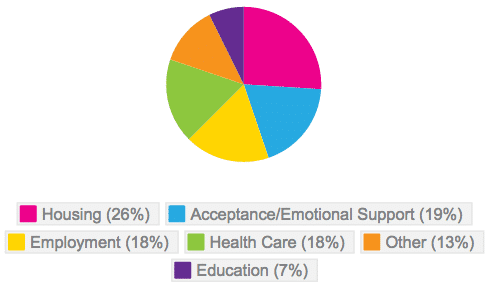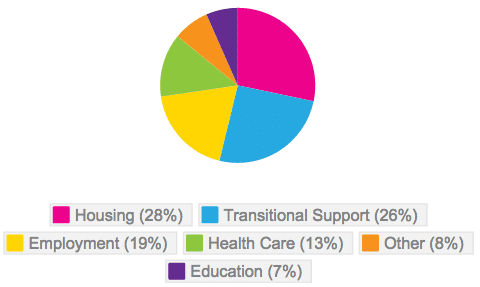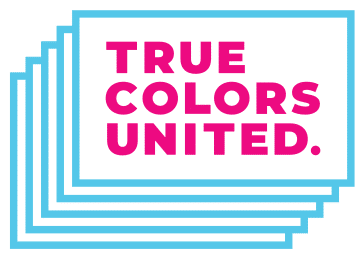
Across the country, lesbian, gay, bisexual, and transgender (LGBT) Americans are vulnerable to discrimination in the workplace.
Only 22 states in our country (plus Washington, D.C.) have state-level laws in place to protect employees from discrimination based on sexual orientation. Of those states, only 17 also prohibit discrimination based on gender identity. 28 states in our country have no statewide workplace protections for sexual orientation and gender identity.
That means that in 28 states, you can get married on Monday, announce it on Facebook Monday night, and get fired Tuesday morning just for being gay. Or that, in 28 states, a transgender young person can be fired for “breaking company dress code” or told they “don’t fit with the organizational culture.”
For youth and adults alike, losing a job can be a pathway to homelessness, and discrimination in the hiring process can prolong one’s experience with homelessness. According to our research, LGBT youth experiencing homelessness cite employment as one of their top needs, after housing, social acceptance, and transitional support.
[columns] [span6]
Needs of Lesbian, Gay, Bisexual, and Queer/Questioning Youth Experiencing Homelessness

[/span6][span6]
Needs of Transgender Youth Experiencing Homelessness

[/span6][/columns]
You might be thinking, “Losing your job because you’re gay? How often does something like that really happen?” According to a new report from the Williams Institute, it happens enough to warrant legal protections for all LGBT Americans.
The Williams Institute sent out requests for data on discrimination complaints to the 22 states with employment nondiscrimination laws based on sexual orientation and gender identity. Fourteen states responded to the request, including California, Colorado, Connecticut, Hawaii, Illinois, Maryland, Minnesota, New Hampshire, New York, Oregon, Rhode Island, Washington, Wisconsin, and the District of Columbia. Here’s what they found:
“Nationally, on average, approximately 4.6 complaints of sexual orientation and gender identity discrimination are filed for every 10,000 LGBT workers each year, compared to approximately 4.9 complaints of race discrimination filed for every 10,000 workers of color, and 3.7 complaints of sex discrimination filed for every 10,000 female workers.”
In other words, “sexual orientation and gender identity employment non-discrimination laws are used by LGBT people at a similar rate to the use of race nondiscrimination laws by people of color and sex discrimination laws by women.”
So yeah, LGBT people experience discrimination quite often.
You might be thinking, “Okay, so discrimination is real. The world isn’t perfect. Even if we put laws in place, how is our government supposed to handle all these discrimination complaints? It can only do so much.”
According to the report, the annual number of complaints related to sexual orientation and gender identity discrimination is quite low when compared to those related to race and sex discrimination. The Williams Institute found that “the annual average number of sexual orientation and gender identity complaints for all 14 states that provided data was 1,600, compared to 9,800 complaints of race discrimination and 13,700 complaints of sex discrimination.”
The volume of these complaints isn’t going to overwhelm government agencies. Laws protecting LGBT employees from discrimination are doable – and worth it.
“Only 1,600 complaints?!” you say. “Why care about such a small number?”
Remember the per-capita breakdown. Sexual orientation and gender identity-based discrimination complaints are filed at significant rates. Just because LGBT people are a minority, doesn’t mean they’re insignificant. Nearly 6.5 million workers in the U.S. identify as lesbian, gay, bisexual or transgender. 49% of them live in states that expressly prohibit employment discrimination based on sexual orientation, and approximately 40% live in states that prohibit employment discrimination based on gender identity. Over half of the LGBT workforce in the U.S. is left unprotected from discrimination based on their sexual orientation or gender identity.
Most LGBT Americans can be fired just for being who they are. It’s wrong. But it’s all perfectly legal.
No one deserves to be out of a job, homeless, or treated unfairly because of their sexual orientation or gender identity. Securing workplace protections for all LGBT Americans would help prevent LGBT youth homelessness in the United States.
Read the full Williams Institute report here.
